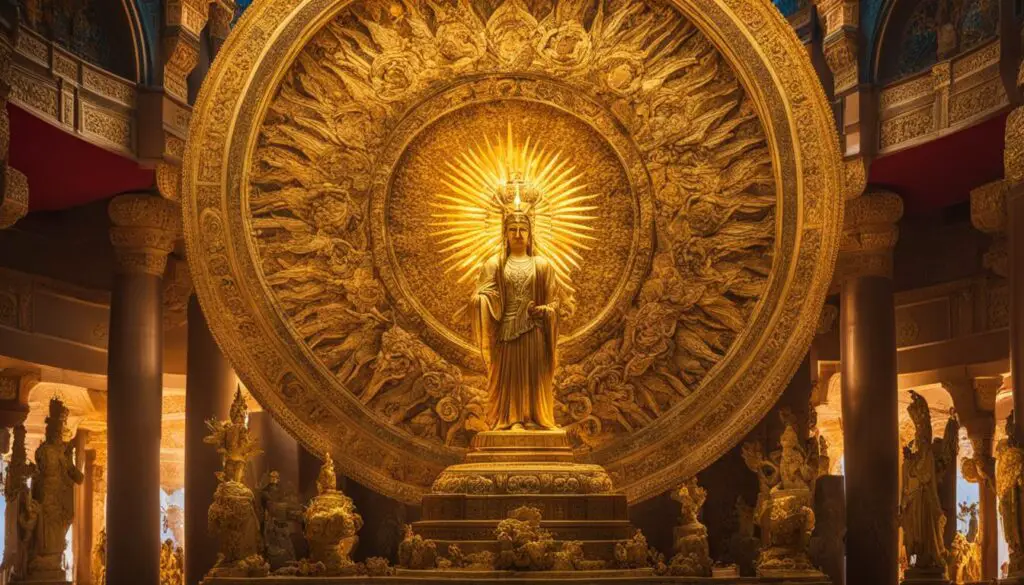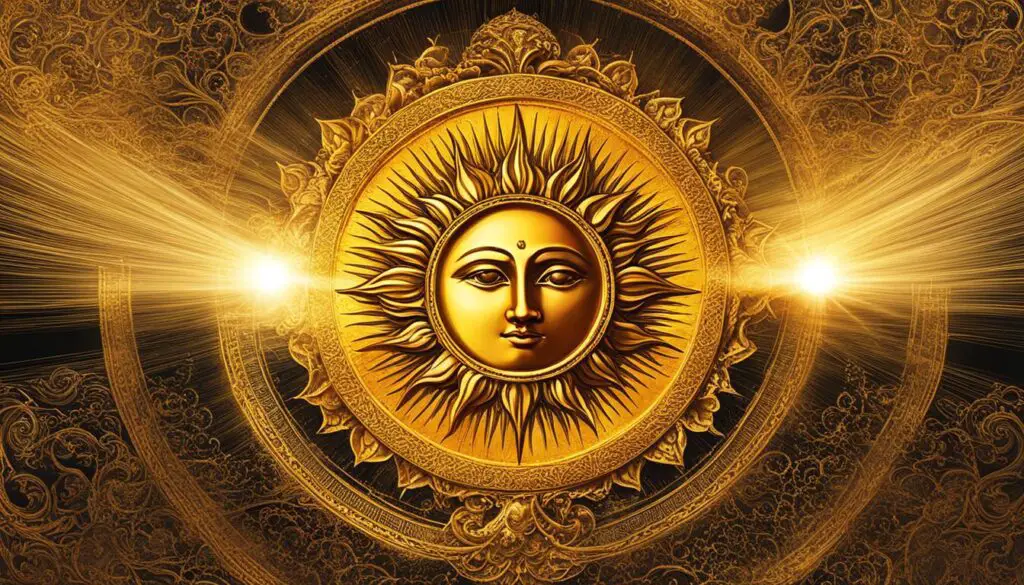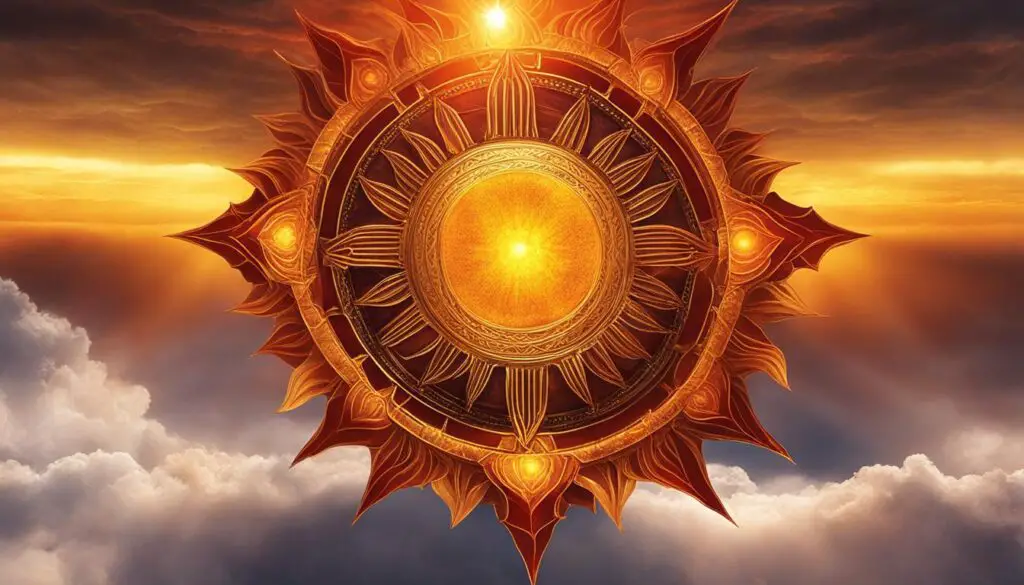The sun holds great significance in the Bible, serving as more than just a celestial body. It is often associated with solar imagery and carries deep symbolism in Scripture. Sun references can be found throughout the Bible, conveying important spiritual truths and divine attributes.
Key Takeaways:
- The sun in the Bible represents more than just a physical object; it holds deep spiritual symbolism.
- Solar imagery is used to convey spiritual truths and divine attributes.
- Sun references can be found throughout Scripture, highlighting its importance in biblical text.
- The symbolism of the sun warns against idolatry and emphasizes the power and presence of God.
- Understanding the significance of the sun enhances our understanding of Scripture and deepens our faith journey.
The Sun in Creation and Its Purpose
The sun plays a significant role in the creation account described in the Bible. According to the book of Genesis, the sun is referred to as the “greater light” that rules the day, along with the moon being the “lesser light” that rules the night. This imagery highlights the importance and prominence of the sun in God’s design.
Interestingly, the sun was created after the Earth, stars, and even plants. This order of events may be intentional, emphasizing that the sun is not the ultimate source of life and divine power. Instead, it serves a specific purpose in marking and dividing times and seasons. The sun’s role in providing light and regulating the Earth’s cycles showcases God’s wisdom and order in the creation.
To better understand the significance of the sun’s creation, let’s take a look at the table below:
| Order of Creation | Significance | |
|---|---|---|
| 1 | Earth, stars | Foundation and vastness of creation |
| 2 | Plants | Preparation for life on Earth |
| 3 | Sun | Regulation of times and seasons |
The sun’s purpose in creation is not to be worshipped or revered as a deity, but rather to serve as a faithful marker of time, seasons, and cycles. It is a testament to God’s order and design in the universe.
The creation of the sun, placed after the other elements of the cosmos, showcases God’s intentionality and authority over all creation. It serves as a reminder that the sun is not to be worshipped, but rather respected as a part of God’s divine plan. The sun’s existence and purpose in creation point to the overarching power and wisdom of the Creator.
The Sun’s Purpose in Creation
The sun’s purpose in creation is not to be worshipped or revered as a deity, but rather to serve as a faithful marker of time, seasons, and cycles. It is a testament to God’s order and design in the universe. By providing light and regulating the Earth’s rhythms, the sun enables life to flourish and demonstrates the intricate balance established by the Creator.
Sun Worship and Idolatry
Sun worship is one of the oldest forms of false religion and was prevalent among ancient civilizations. The worship of the sun was particularly prominent in Egyptian and Chaldean cultures, where various sun gods and goddesses were worshipped. The Israelites, however, were explicitly warned against participating in this idolatrous practice.
Sun worship involved rituals, sacrifices, and the belief that the sun was a powerful deity who controlled the natural elements and influenced the course of life. It was seen as a means to gain favor, protection, and prosperity from the sun god.
The Bible consistently condemns the worship of false gods and warns against idolatry. In Deuteronomy 17:3, God commands the Israelites to not worship the sun, moon, or any other heavenly bodies. This commandment was given to protect the Israelites from being led astray and to emphasize that the sun, as a created entity, should not be worshipped as divine.

“You shall have no other gods before me. You shall not make for yourself a carved image, or any likeness of anything that is in heaven above, or that is in the earth beneath, or that is in the water under the earth. You shall not bow down to them or serve them, for I the Lord your God am a jealous God…” – Exodus 20:3-5
Despite the warnings, the Israelites were sometimes drawn to the practices of their neighboring nations and were enticed by the allure of sun worship. The consequences of idolatry were severe, and the prophets continually called the people back to the worship of the one true God.
Miracles Involving the Sun in Scripture
The Bible contains accounts of several miraculous events involving the sun. These supernatural phenomena serve as awe-inspiring demonstrations of God’s power and authority over creation. Let’s explore some of these remarkable occurrences:
The Plague of Darkness
“Then the Lord said to Moses, ‘Stretch out your hand toward heaven, that there may be darkness over the land of Egypt, a darkness to be felt.’ So Moses stretched out his hand toward heaven, and there was pitch darkness in all the land of Egypt for three days.” – Exodus 10:21-22
During the time of the plagues in Egypt, God brought about a supernatural darkness that covered the entire land for three days. This darkness was so intense that it could be felt. It was a powerful sign of God’s judgment and a demonstration of His authority over the sun, which was considered one of the gods worshipped by the Egyptians.
The Long Day of Joshua
“And the sun stood still, and the moon stopped, until the nation took vengeance on their enemies. Is this not written in the Book of Jashar? The sun stopped in the midst of heaven and did not hurry to set for about a whole day.” – Joshua 10:13
During a battle against their enemies, Joshua and the Israelites witnessed an extraordinary event where the sun and moon appeared to stand still for about a whole day. This miracle allowed the Israelites to achieve victory and demonstrated God’s power over time and celestial bodies.
The Sundial of Hezekiah
“Behold, I will make the shadow cast by the declining sun on the dial of Ahaz turn back ten steps.” So the sun turned back on the dial the ten steps by which it had declined.” – Isaiah 38:8
In response to King Hezekiah’s prayer for healing, God performed a miraculous sign by causing the shadow on the sundial to reverse its course by ten steps. This supernatural phenomenon affirmed God’s sovereignty over time and the sun, providing Hezekiah with reassurance of God’s faithfulness.
Darkness at Jesus’ Crucifixion
“Now from the sixth hour there was darkness over all the land until the ninth hour.” – Matthew 27:45
During the crucifixion of Jesus, darkness covered the land from the sixth hour to the ninth hour. This supernatural darkness signified the suffering and sacrifice of Christ and emphasized the profound nature of His death on the cross.
These miraculous events involving the sun in Scripture demonstrate God’s ability to intervene in the natural order of the universe and bring about supernatural phenomena. They serve as powerful reminders of His sovereign control over all creation, including the sun and celestial bodies.
Future Prophecies Involving the Sun
The Bible contains prophetic passages that describe significant events involving the sun. These prophecies provide insight into the end times and God’s ultimate plan for the world. They depict a time of great upheaval and divine intervention, with cosmic signs and cosmic disturbances affecting the sun and other celestial bodies.
One prophecy mentions the sun being darkened and the moon not giving its light, which signifies a period of darkness and judgment. This symbolizes the decline of earthly powers and the onset of divine judgment on unrepentant hearts. The stars falling from the sky and signs in the sun, moon, and stars indicate the magnitude and global impact of these events, causing fear and distress among nations.
These future prophecies involving the sun highlight God’s sovereignty and control over the universe. They remind believers of the temporary nature of earthly powers and the certainty of God’s ultimate victory. Amidst the chaos and uncertainty, they serve as a call to faith and a reminder to trust in God’s providence and promises.
In the words of Jesus, “There will be signs in the sun, moon, and stars. On the earth, nations will be in anguish and perplexity at the roaring and tossing of the sea” (Luke 21:25). These signs serve as a powerful reminder that God is in control of history and will bring about the fulfillment of His purposes.
Summary:
In summary, the Bible contains prophecies about the sun in the future. These prophecies describe cosmic signs and disturbances, including the darkening of the sun, moon, and falling of the stars. These events signify divine judgment, the decline of earthly powers, and the certainty of God’s ultimate victory. They remind believers of the temporary nature of worldly things and the need to trust in God’s providence.
| Prophecy | Description |
|---|---|
| Sun Darkened | The sun will be darkened, signifying a time of darkness and judgment. |
| Moon not giving light | The moon will not give its light, symbolizing the decline of earthly powers. |
| Stars Falling | The stars will fall from the sky, indicating the magnitude and global impact of these events. |
| Signs in the Sun, Moon, and Stars | There will be signs in the sun, moon, and stars, causing fear and distress among nations. |

Hebrew and Greek Words for “Sun”
In the Bible, the sun is referred to using different Hebrew and Greek words. Understanding these words can provide deeper insights into the significance of the sun in Scripture.
Hebrew Words for “Sun”
In the Old Testament, the primary Hebrew word for “sun” is “shemesh.” This word is used to describe the physical sun that illuminates the earth and provides light and heat. Additionally, the Hebrew word “chammah” is used to specifically refer to the heat of the sun.
Table 6.1 provides a comparison of the Hebrew words for “sun” and their corresponding verses in the Bible:
| Hebrew Word | Meaning | Verses |
|---|---|---|
| Shemesh | Physical sun | Genesis 1:16, Psalm 19:4 |
| Chammah | Heat of the sun | Malachi 4:1, Jonah 4:8 |
Greek Word for “Sun”
In the New Testament, the Greek word for “sun” is “hélios.” This word is used to refer to the physical sun, similar to its Hebrew counterpart. It appears in verses like Matthew 5:45 and Matthew 13:6 to describe the rising and setting of the sun.
Table 6.2 provides a comparison of the Greek word for “sun” and its corresponding verses in the Bible:
| Greek Word | Meaning | Verses |
|---|---|---|
| Hélios | Physical sun | Matthew 5:45, Matthew 13:6 |
Understanding the Hebrew and Greek words for “sun” allows us to gain a more nuanced understanding of its usage and symbolism in Scripture. The sun represents various concepts and carries spiritual significance, highlighting God’s power and provision in our lives.

“The physical sun can serve as a reminder of God’s provision and power.”
Symbolism and Meaning of the Sun in Scripture
The sun holds significant symbolism in Scripture, representing various concepts that enrich our understanding of God and spiritual truths. As we explore the symbolism of the sun in the Bible, we gain insights into divine attributes, the person of Jesus Christ, and the purity of heavenly beings.
Symbolizing the Law of God
In Scripture, the sun is used metaphorically to represent the law of God. Just as the sun provides light and guidance to the world, the law illuminates our path and reveals God’s will. The psalmist beautifully expresses this symbolism, saying, “The law of the Lord is perfect, refreshing the soul” (Psalm 19:7).
Representing the Presence and Glory of God
The sun also symbolizes the presence and glory of God. In Malachi 4:2, the prophet speaks of the “Sun of Righteousness” who brings healing and salvation. This points to Jesus Christ, who is the ultimate manifestation of God’s presence and glory on earth. Just as the physical sun provides warmth and light, Jesus radiates God’s love and reveals His glory to humanity.
Purity of Heavenly Beings
Additionally, the sun symbolizes the purity of heavenly beings. In Revelation 1:16, John describes Jesus’ face shining “like the sun in all its brilliance.” This imagery highlights the holiness and purity of Jesus and those who dwell in His presence. The sun serves as a reminder of the radiant beauty and purity found in heaven.
| Symbolism | Meaning |
|---|---|
| Law of God | Guidance, revelation of God’s will |
| Presence and Glory of God | Divine manifestation, salvation through Jesus |
| Purity of Heavenly Beings | Holiness, radiant beauty |

The sun’s symbolism in Scripture invites us to contemplate the profound truths revealed through this celestial body. It reminds us of the guidance and revelation found in God’s law, the presence and glory of Jesus Christ, and the purity and holiness of heavenly beings. As we meditate on the sun’s symbolism, may it deepen our understanding of the spiritual significance found within the pages of Scripture.
The Sun as a Source of Light and Life
The sun is not only a celestial body that illuminates our world, but it also serves as a symbol of God’s provision and power. Just as the sun is the primary source of light and heat in our solar system, God is the ultimate source of all light and life. Through the warmth and radiance of the sun, we witness the sustaining force that nurtures and supports life on Earth.
When we contemplate the sun’s role in our physical existence, it can remind us of the spiritual truth that God is the source of all life. In the book of Psalm, it is written, “For the Lord God is a sun and shield; the Lord bestows favor and honor; no good thing does he withhold from those whose walk is blameless” (Psalm 84:11, NIV). This verse emphasizes that God’s light and protection are available to those who walk in righteousness.
“For the Lord God is a sun and shield; the Lord bestows favor and honor; no good thing does he withhold from those whose walk is blameless.”
The sun’s warmth and brilliance also serve as a metaphor for God’s love and presence. Just as the sun’s rays reach every corner of the Earth, God’s love and presence are ever-present and all-encompassing. His light shines into the darkest areas of our lives, offering warmth, comfort, and guidance.
In conclusion, the sun in the Bible not only represents the physical source of light and heat but also carries profound spiritual significance. It reminds us that God is the ultimate source of all life and light, providing for our physical and spiritual needs. As we bask in the sun’s glow, let us be reminded of God’s constant presence and the abundant life He offers.

Sun Symbolism in Scripture
The symbolism of the sun in Scripture goes beyond its role as a source of light and life. It is often used as a symbol for the law of God, representing His righteous requirements and guidance. Just as the sun illuminates and reveals the world, God’s law brings clarity and understanding to our lives.
Additionally, the sun is used metaphorically to represent the presence and glory of God. In Malachi 4:2, it is written, “But for you who fear my name, the sun of righteousness shall rise with healing in its wings” (ESV). This verse speaks of the coming of Jesus, who brings healing and salvation to those who believe in Him.
The sun’s purity and brilliance also symbolize the heavenly radiance of angelic beings. In Revelation 1:16, it is described that Jesus’ face shone “like the sun in full strength” (ESV), emphasizing His divine nature and glory.
| Symbolism of the Sun in Scripture | Meaning |
|---|---|
| Source of Light and Life | God as the ultimate provider and sustainer of all life |
| Law of God | Divine guidance and righteous requirements |
| Presence and Glory of God | God’s radiance and divine attributes |
| Heavenly Beings | The purity and brilliance of angelic beings |
Conclusion
The sun in the Bible holds immense biblical symbolism and spiritual significance. It represents the power and divine attributes of God, reminding us of His sovereignty and authority over creation. Throughout Scripture, the sun is used metaphorically to convey deeper spiritual truths.
One significant aspect of the sun’s symbolism is its warning against idolatry. The worship of the sun was prevalent in ancient civilizations, but God cautioned His people against participating in this false religion. By understanding the dangers of idolatry, we can guard our hearts and worship the one true God.
Furthermore, the sun serves as a metaphor for spiritual concepts. It represents the law of God, illuminating our path and guiding us in righteousness. The sun also symbolizes the presence and glory of God, reflecting His radiance and majesty. Additionally, the sun points to Jesus Christ, who is the light of the world, offering us salvation and eternal life.
By recognizing the symbolism and spiritual significance of the sun in the Bible, we can deepen our understanding of Scripture and draw closer to God. As we contemplate the role of the sun in creation, miracles, and future prophecies, we are reminded of God’s control over the universe and His faithful fulfillment of His plans. Let us embrace the profound meaning of the sun in the Bible and allow it to illuminate our faith journey.
FAQ
What is the meaning of the sun in the Bible?
The sun in the Bible carries profound symbolism and represents the power and divine attributes of God. It also serves as a metaphor for spiritual truths.
How is the sun mentioned in the creation account?
The sun is described as the “greater light” that rules the day in the creation account in Genesis. Its purpose was to mark and divide times and seasons.
Was sun worship prevalent in ancient civilizations?
Yes, sun worship was one of the oldest forms of false religion and was common among ancient civilizations such as the Egyptians and Chaldeans. The Israelites were warned against participating in this idolatry.
Are there any miracles involving the sun mentioned in Scripture?
Yes, the Bible records several miracles involving the sun, including three days of supernatural darkness in Egypt during the plagues, a long day when the sun and moon stood still for Joshua, and darkness covering the land during Jesus’ crucifixion.
Are there any prophecies about the sun in the future?
Yes, the Bible contains prophecies about the sun being darkened, the moon not giving its light, and signs in the sun, moon, and stars causing dismay among nations. These future events serve as a demonstration of God’s control over the sun and the universe.
What are the Hebrew and Greek words for “sun”?
The Hebrew word for “sun” is “shemesh,” and another Hebrew word, “chammah,” refers to the sun or the heat of the sun. In the New Testament, the Greek word for “sun” is “hélios.”
What is the symbolism and meaning of the sun in Scripture?
The sun is used symbolically in Scripture to represent various concepts such as the law of God, the presence and glory of God, the person of Jesus Christ, and the purity of heavenly beings. The sun holds spiritual significance and represents divine attributes and qualities.
How does the sun serve as a source of light and life?
The sun is the primary source of light and heat in our solar system. It illuminates the Earth and sustains life. In a similar way, God is the ultimate source of all light and life. The physical sun can serve as a reminder of God’s provision and power.
What is the significance of understanding the sun in the Bible?
Understanding the significance of the sun in the Bible can deepen our understanding of Scripture and our faith journey. It reveals the power and divine attributes of God, warns against idolatry, and serves as a metaphor for spiritual truths.







